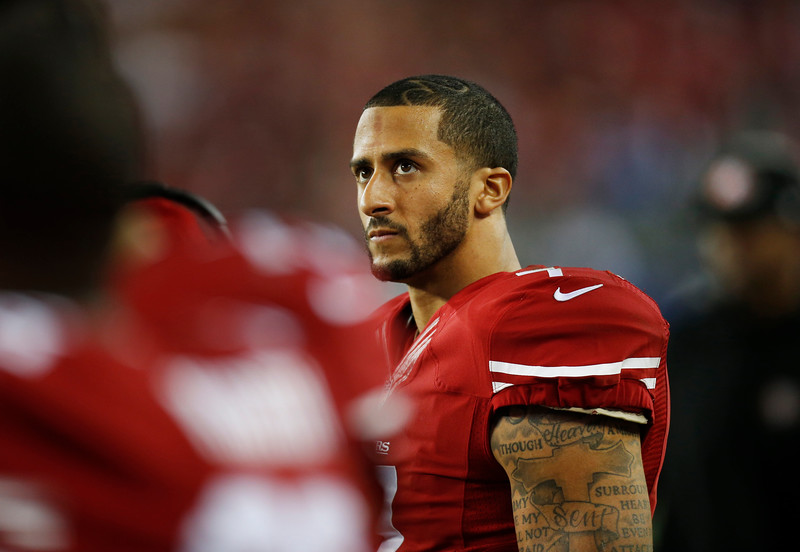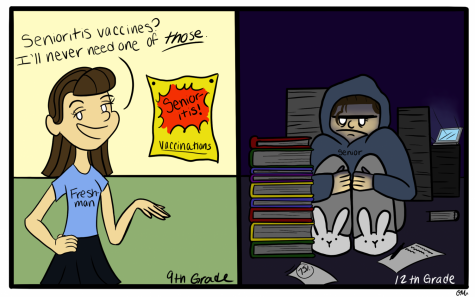Point: Supporting Colin Kaepernick and freedom of expression
Taking a knee for justice
San Francisco 49ers player Colin Kaepernick made headlines on August 26th during the National Anthem at the 49ers-Packers preseason game when he made the decision not to stand during the singing of the National Anthem.
Kaepernick justified his actions, saying, “I am not going to stand up to show pride in a flag for a country that oppresses black people and people of color. To me, this is bigger than football, and it would be selfish on my part to look the other way. There are bodies in the street and people getting paid leave and getting away with murder.”
Based on his speech, one would assume Kaepernick is referencing the never-ending cases of police brutality that this nation has seen. Kaepernick, being black himself, feels strongly about these issues that impact his entire community. After the incident, Kaepernick went on to say that he would not stand for the national anthem until he felt that enough measures were taken to curb police brutality.
Especially in recent years, police misconduct and brutality have come at the forefront. The death of Michael Brown sparked riots in Ferguson, Missouri back in 2014, and the death of Freddie Grey set off a days-long riot in Baltimore. Both sides of the aisle, left and right, hold strong beliefs on the subject, with those on the left tending to side with the victims of police brutality and those on the right tending to agree with the officers’ perspectives.
This issue is incredibly nuanced, but regardless of whether or not one considers Kaepernick’s actions to be justified, there is no denying that he has the right to do so. The First Amendment to the Constitution guarantees his right to protest, and this is his form of protest.
Many former fans of Kaepernick went to extreme lengths to show their disapproval of his actions; one man even burned a Kaepernick jersey and filmed it, uploading the video online.
In response to the incident, veterans across the country came out on both sides. One disabled former marine sergeant Joey Jones tweeted, “I don’t have legs but I’ll stand w/ [with] enough pride for both of us every time my National Anthem plays.” This idea was echoed by a large number of veterans.
However, many veterans also came out in support of Kaepernick, starting the hashtag “VeteransforKaepernick”. One veteran named Trey Walker was one of those, tweeting, “Stop deliberately trying to miss the message by crucifying the messenger.”
Opponents of the football player’s actions claim that he is being “un-American” and “disrespectful.” Republican presidential candidate Donald Trump went so far as to say, “Maybe he should find a country that works better for him,” implying that Kaepernick should leave the country.
But that argument is even more “un-American,” seeing that Mr. Trump is essentially telling Kaepernick to simply agree with every action the US government makes, right or wrong, and not voice his concerns. The US was founded on citizens voicing their concerns and exercising their right to protest, and there is nothing more American than that.
For most Americans, the question is not whether or not Kaepernick could refuse to stand but rather, whether he should. Some say that his passive protest was disrespectful to the veterans who have served this country. Some will say that Kaepernick should have brought the issue up in a different manner so as to not be disrespectful. However, had Kaepernick simply done a press conference or spoken out, he would not have received nearly as much media attention, nor would his message have been spread so quickly.
By sitting down during the anthem, Kaepernick sparked outrage, which spread the story further than it would have gone by conventional means. He evidently feels passionate towards the subject of police brutality and took a strong measure to show that. Unfortunately, his message was missed in the arguments over patriotism. So his method did not work as well as he had probably hoped.
¨I would certainly say he has the Constitutional right to protest. I agree with the fact that he is trying to draw attention to an issue, but I think it draws attention away from the issue and towards himself,¨ said Government and AP United States History teacher Mr. Thieke.
In the hopes to reconcile the issue, Kaepernick instead took a knee at the next game, showing respect for those in the military but still protesting for what he feels is right. This seems to have eased tensions.
Although the flag should be held in high regard, Colin Kaepernick did what he thought was right without resorting to violence or any extreme measures. He knew how to bring the public’s attention to the issue of police brutality, and there is nothing more American than standing up for your rights and the rights of others. There is nothing wrong with standing up, or sitting down, rather, for what you believe in.





